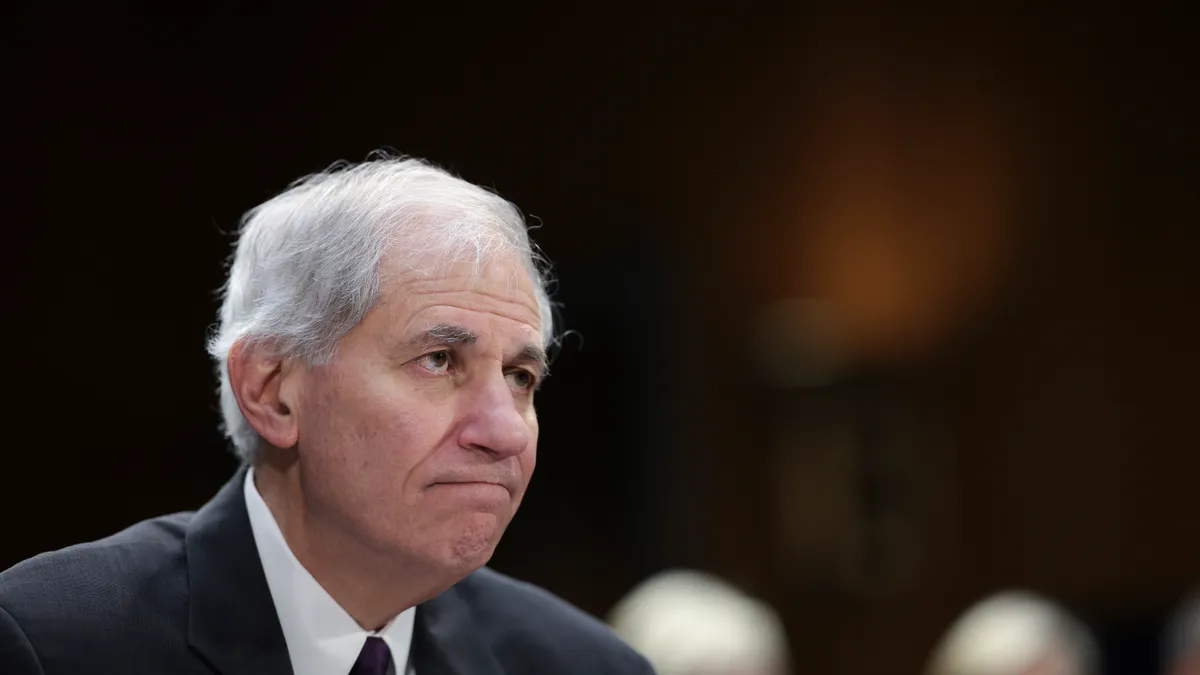Sen. Joni Ernst, R-IA, reiterated her call Wednesday for Federal Deposit Insurance Corp. Chair Martin Gruenberg to resign in the wake of allegations, published in The Wall Street Journal this month, that the agency turned a blind eye to sexual misconduct and enabled a toxic workplace culture.
In a letter to Gruenberg, Ernst skewered at least two of the agency’s efforts to confront the allegations.
“Your move to appoint a special committee to oversee a ‘review of the agency’s workplace culture’ is simply too little, too late,” Ernst said Wednesday.
That panel, established last week, is not the only body to examine the regulator’s response to the alleged workplace toxicity. The agency’s Office of the Inspector General will conduct a "special inquiry" into “leadership climate at the FDIC” and how those leaders have handled complaints about sexual harassment and other inappropriate conduct, Reuters and The Wall Street Journal reported this week, citing a spokesperson of the OIG.
The OIG will also assess the agency’s sexual harassment prevention program, including looking at what steps the FDIC has taken since a 2020 OIG report found the agency’s handling of complaints was deficient, the publications reported.
“This time, there needs to be more than just a survey of the workforce,” Ernst said Wednesday. “Shuffling the seating chart to move bad actors from one department to another isn’t going to cut it anymore.”
The FDIC did not respond to a request for comment from The Wall Street Journal regarding Ernst’s letter.
Ernst was among the first lawmakers to call for Gruenberg to resign after he backtracked in testimony this month, acknowledging he had been investigated in 2008 for misconduct after earlier saying he had not.
“Accountability is coming,” Ernst wrote on X — formerly Twitter — on Nov. 16.
She ratcheted up her frustration Wednesday, blasting an apology Gruenberg gave FDIC employees during an all-hands meeting days after the Wall Street Journal report surfaced.
“The civil servants these monsters abused are owed more than just an apology, they deserve justice,” Ernst said Wednesday. “There needs to be real ramifications. This includes your resignation.”
She also cited the need for “termination” of employees found in the wrong “and criminal prosecution when warranted.”
The FDIC has the legal authority to fire the employees of banks it oversees if they engage in misconduct and disregard for the bank’s well-being, Ernst said.
“These same standards should be applied to the employees at the FDIC who engaged in this revolting behavior,” she added.
What Ernst is asking
Ernst is asking Gruenberg to detail for her — by Dec. 13 — how many settlements and judgments have arisen in connection with workplace misconduct — and how much money has been paid out — since 2005, when Gruenberg joined the FDIC board. Ernst also wants to know of any nondisclosure agreements held by current or former FDIC employees related to workplace misconduct.
The senator also wants Gruenberg to provide records related to complaints, investigations and allegations of “hostile, inappropriate, retaliatory, discriminatory, aggressive or otherwise prohibited workplace behavior” since 2005. Ernst wouldn’t be the first lawmaker to make such a request. The House Oversight Committee, too, sought those records but for a much shorter span — since 2021.
Unlike other lawmakers probing the allegations, Ernst asked specifically of details on the “boozy hotel” referenced in The Wall Street Journal’s expose.
“Given the gravity of the allegations, I expect your special committee to make as much — or more — of an effort than the reporter at The Wall Street Journal did to follow every lead and identify the individuals responsible for destroying the FDIC’s workplace culture,” Ernst wrote Wednesday. “If you do not aggressively pursue each of the allegations and proactively share the findings with law enforcement, Congress, and the American people, I will.”
Past the specter of scandal
The past week or so has seen relative calm after a flurry of reaction from Capitol Hill and the FDIC regarding the workplace misconduct allegations.
The specter of the scandal surfaced Wednesday in a House Financial Services Committee hearing that featured testimony from Consumer Financial Protection Bureau Director Rohit Chopra, an FDIC board member.
“Certainly, any type of these issues are serious,” Chopra said, according to American Banker. Chopra spotlighted the panel the FDIC established last week in response to a question from Rep. Bill Huizenga, R-MI.
The FDIC, meanwhile, has appeared heads-down — focused on a wide range of work. The agency’s OIG published a report Tuesday spelling out 11 recommendations in the wake of First Republic Bank’s failure in May.
The OIG asked the agency to consider quicker action from examiners who issue CAMELS ratings downgrades. It also suggested the FDIC take a fresh look at consequences for banks that fail to take timely action. It also recommended a re-evaluation of guidance connected to uninsured deposit outflows. And it asked the FDIC to consider monitoring banks according to common business characteristics and risks.
Beyond the OIG, the FDIC at large issued its quarterly banking profile Wednesday. Net income fell 3.4%, collectively, from three months earlier, and deposits declined for the sixth straight quarter, according to the report. However, net interest margins rebounded slightly, the FDIC found.




















